The future is female. It doesn't stop at data science teams. Currently, only about one in six data professionals is female, and it is in the interest of companies and society to promote gender diversity in data professions. Companies are actively looking for more female Data Scientists to join their teams, and we want to help. That's why we asked nine inspiring "Women in Data" about their experiences, learnings and advice for female newcomers.
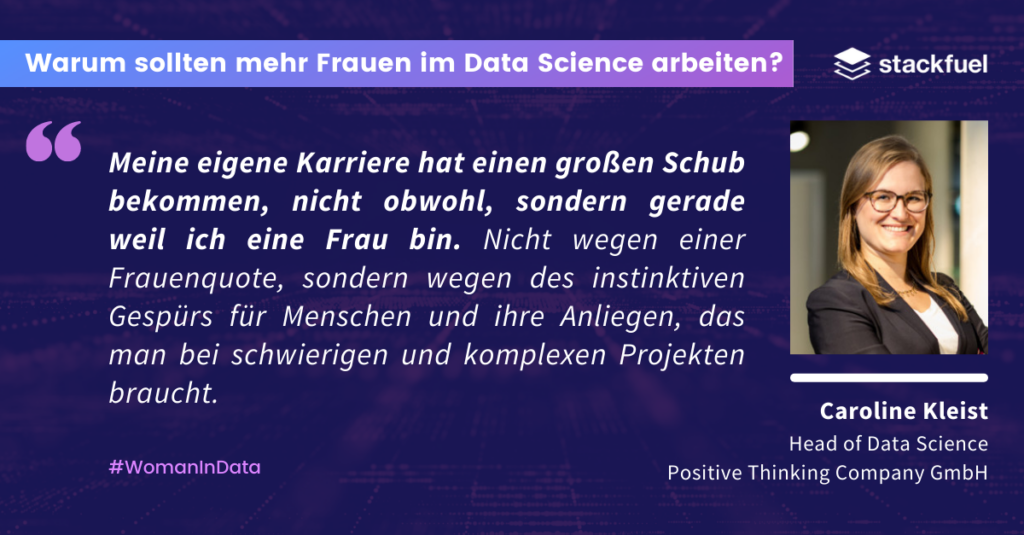
Caroline Kleist Head of Data Science, Positive Thinking Company GmbH:
What do you love about working with data/data science?
Working with data and Data Science requires so many different skills and always brings new challenges. It's probably one of the most diverse jobs you can do right now. I love that we are all working together at the forefront of innovation and putting things that are just coming out of research directly into practice. Together, we're changing our everyday lives and our companies with the newest and edgiest topics you can get your hands on - how exciting is that, please?
How did you get started in the industry?
The obvious answer is that I studied statistics and have always loved working with data, so I started working in the tech industry in 2015. At that time, there wasn't even a job description for "Data Scientist" in Germany and to be honest - I was just very lucky to start in this industry just before it got so hyped and I'm very grateful for that. The less obvious answer is that I always had all the options as a kid: my parents gave me both dolls and steam engines to play with, laying the most important foundation for my career in tech. It never mattered whether I was a boy or a girl.
Why do you think more women should work in tech and data science?
Besides programming, math and all the technical skills, there is one very important superpower you need to be successful with data and technical projects in general: empathy and strong communication skills. I'm not a fan of attributing certain traits to men or women because we're all individual, but we women are said to have a lot of empathy and good communication skills, right? So let's put them to good use! My own career has gotten a big boost, not even though I'm a woman, but because I am. - And not because of the women's quota, but because of that instinctive feel for people and their concerns that you need on difficult and complex projects. For example, if you want to establish a new culture around the use of AI and machine learning in a company, you will most likely face silos and rather closed structures in companies. To be successful with this mission, everyone involved needs to be convinced. Women often have a special sense for this and anticipate the importance of explaining the results or algorithms to everyone in such a way that in the end everyone understands and is convinced. This skill is really needed in our data science projects, and that's why I would like to see more women in the tech and data science industry.
How can we inspire more women to pursue careers in Data Science?
We really need to emphasize the empathy I just mentioned, which is much needed for data science and engineering projects. And, of course, we need to continue to encourage girls to be curious about and choose science subjects in school and university, and not shy away from them. The more role models there are, the more likely we are to inspire little girls, so let's talk about and share our stories.
Do you have any advice for women looking to break into the industry?
Be yourselves and be confident about it! Do not waste a thought and energy on whether someone might consider your competence or your abilities inferior just because you are women. If you don't have doubts about your abilities, then those around you don't either. It goes without saying that women work in the tech industry, and it starts with you.
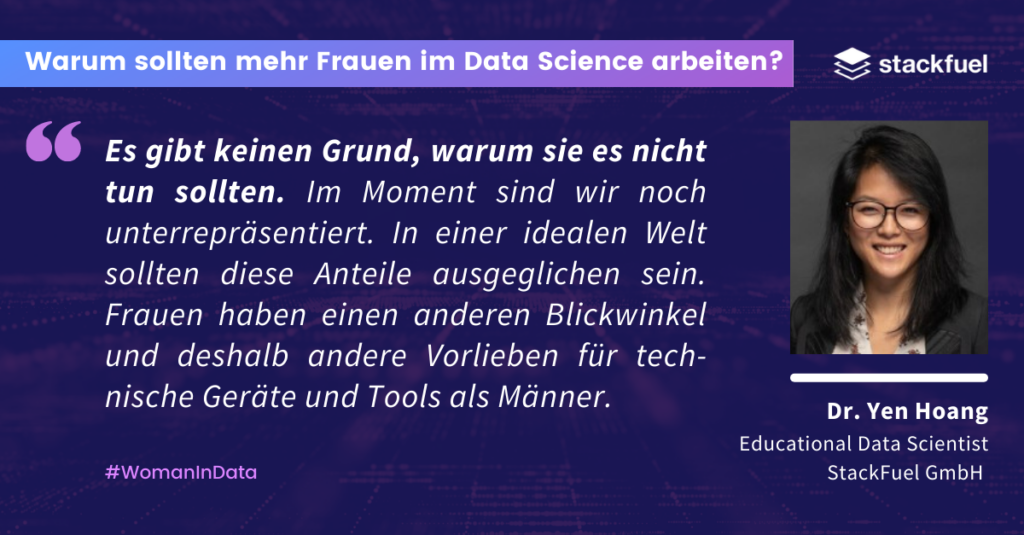
Dr. Yen Hoang, Educational Data Scientist, StackFuel GmbH
What do you love about working with data/data science?
Working with data is like speaking a language. The different applications are just dialects. My background is in the medical field, but I can quickly understand the critical points when discussing different analysis approaches for sales or tracking data, for example.
How did you get started in the industry?
One of my first work experiences was analyzing Next Generation Sequencing data from a breast cancer patient whose cancer treatment was not producing the expected results. So I had to find the few genes (out of 25,000) that were mutated so that the doctors could move forward with individualized targeted gene therapy for this patient. I was so afraid of making mistakes, but at the same time I was excited and honored. I was totally hooked on data science!
Why do you think more women should work in tech and data science?
There is no reason why they shouldn't. Right now, we're still underrepresented, and in an ideal world, the numbers should be balanced. Women have a different perspective and taste in tech devices and tools than men. That's why it's important to include women in programming tools that everyone uses.
How can we inspire more women to pursue careers in Data Science?
There are several steps we can take. I really believe it starts in the early years of childhood. Parents should stop separating their children by gender and buying Barbies for girls and fire trucks for boys. It's important to encourage girls more to get excited about data and programming in school. In the professional world, I think a certain quota of women should be required by law in technology and data departments above a certain size. Why only in management positions? If we start living in an ideal world, children can see and experience that it is normal for women to work with data. And after a generation, this quota will be superfluous. But I think it should also work the other way around, for example, more men should be encouraged to go into nursing.
Do you have any advice for women looking to break into the industry?
It's hard to get a job in tech/data processing as a woman, no question. I've experienced that as well. It's important not to underestimate yourself. Believe in yourself. Be strong. Remind yourself (maybe even daily) that you've already accomplished a lot. And don't be shy with your certificates and your GitHub repos. This is where your code tells the story of your hard work.
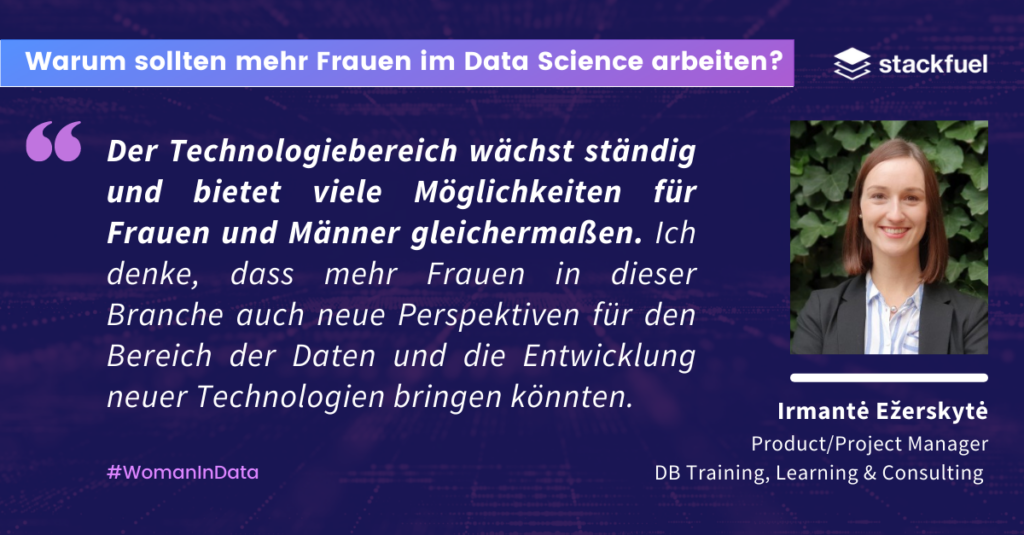
Product/Project Manager at DB Training, Learning & Consulting
What do you love about working with data/data science?
Since the data field is fairly new to me, I find it exciting to learn how many opportunities the effective use of available data opens up in any industry. I have a social science background and find it extremely interesting from a social perspective how the right data visualization and presentation affects human perception.
How did you get started in the industry?
I would say that the data industry found me rather than the other way around. I came across this industry after I started my new position as product manager at DB Training, and data courses are part of my portfolio. This challenges me and at the same time motivates me to learn new things.
Why do you think more women should work in tech and data science?
The technology sector is constantly growing and offers many opportunities for women and men alike. I think that more women in this industry could also offer new perspectives for the field of data and the development of new technologies.
How can we inspire more women to pursue careers in Data Science?
I think it's hard to push someone into a particular field. However, attractive training and educational opportunities within a company could provide a deeper understanding of the field and promote it as a career path.
Do you have any advice for women looking to break into the industry?
Just step out of your comfort zone and try new things if you're interested.
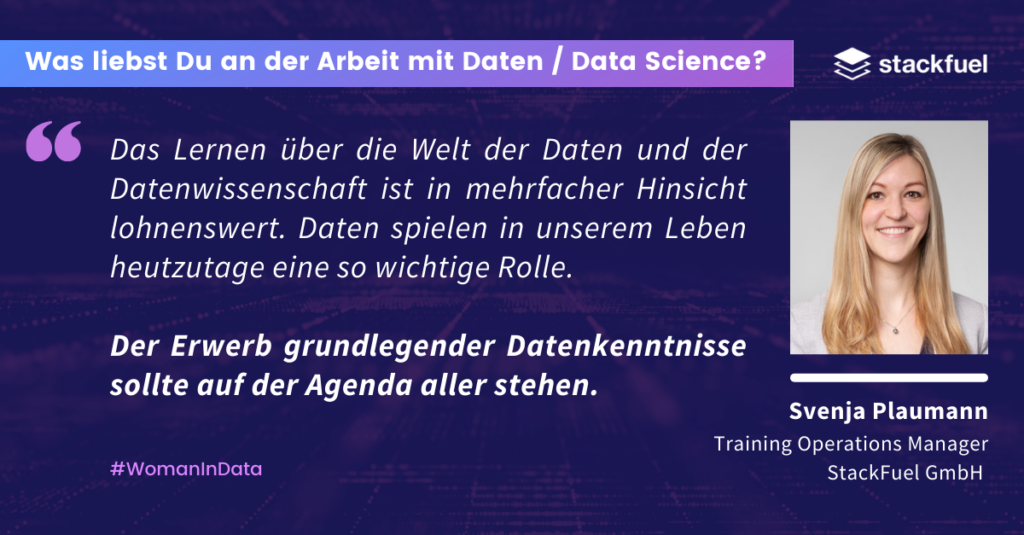
Svenja Plaumann,Training Operations Manager, StackFuel GmbH
What do you love about working with data/data science?
Learning about the world of data and data science is rewarding in many ways. Data plays such an important role in our lives today. Acquiring basic data skills should be on everyone's agenda - these skills can certainly help put things in perspective.
How did you get started in the industry?
In a world that is increasingly based on data, I was fascinated by the idea of helping people acquire the skills they need to do this. Working at StackFuel has given me the opportunity to actively participate in the digital transformation of vocational education.
Why do you think more women should work in tech and data science?
Women make up about 50 % of the population, but only a fraction of them work in technical or data-related fields. Motivating more women to work in data science is critical to ensuring that unbiased and diverse data is available. We need to actively burst the male-dominated data bubbles and bring unique and diverse perspectives to the table.
How can we inspire more women to pursue careers in Data Science?
By encouraging women to pursue careers in data science now, we are creating role models for all girls and women of the future. Women in data should be the norm - not the exception. Data is biased because female perspectives and topics are still often unrepresented or actively excluded. We can change that - by demanding our right to participate!
Do you have any advice for women looking to break into the industry?
Ask questions, challenge standards, and use data to disprove them!
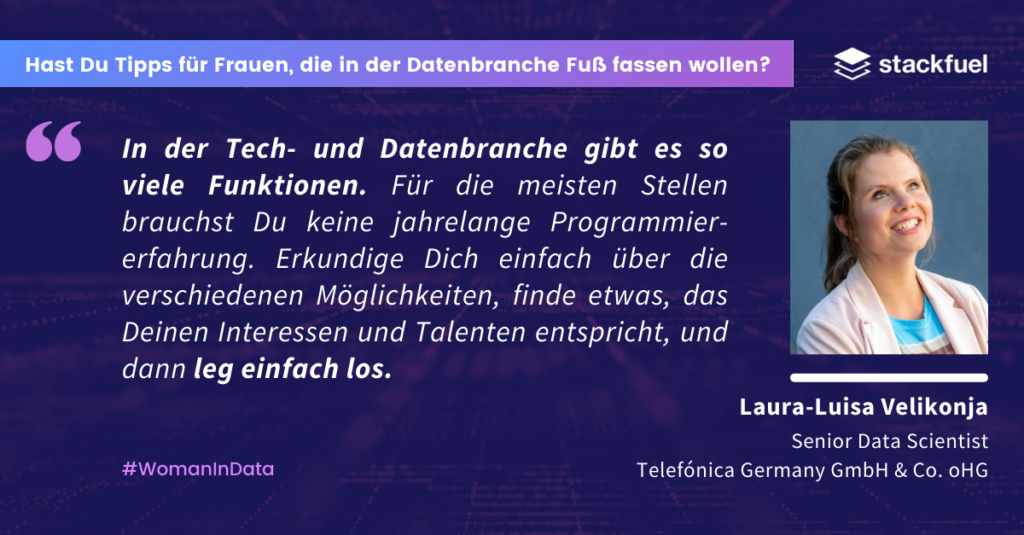
Laura-Luisa Velikonja, Senior Data Scientist, Telefonica S.A.
What do you love about working with data/data science?
I love the versatility of my job. The versatility in terms of topics, methods and tools. It never gets boring and I always learn something new.
How did you get started in the industry?
During my mathematics studies, we were told that you can do anything with mathematics, but deciding on a discipline was quite difficult for me. At that time, I was already a generalist, trying out different student jobs and industries. I felt like I could do a lot of different jobs with Data Science, which turned out to be true. So I started my career with an internship at a data science consultancy in Munich.
Why do you think more women should work in tech and data science?
I firmly believe that mixed teams in any industry produce better results because different perspectives help teams be creative and tackle problems in an increasingly complex world. Unfortunately, there is still a lot to be done in the technology industry in terms of gender diversity. So we should really work on bringing more women, but also more diversity in general, into the technology and data industries. There are huge ethical and moral questions in the data space that we need as many different perspectives on as possible.
How can we inspire more women to pursue careers in Data Science?
In my opinion, careers in data are very exciting, and everyone I tell about my work is excited, but people are afraid of the math and coding component. So that's where we need to start. And we need to start early! We need to get young girls excited about STEM subjects instead of scaring them or telling them what is expected of girls and boys to do well. And of course, role models are important to show young girls that women also love math and programming and working in technical professions.
Do you have any advice for women looking to break into the industry?
There are so many roles in the technology and data industry. For most roles, you don't need years of programming experience. So you should read up on the different opportunities, find something that suits your interests and talents, and then just go for it.
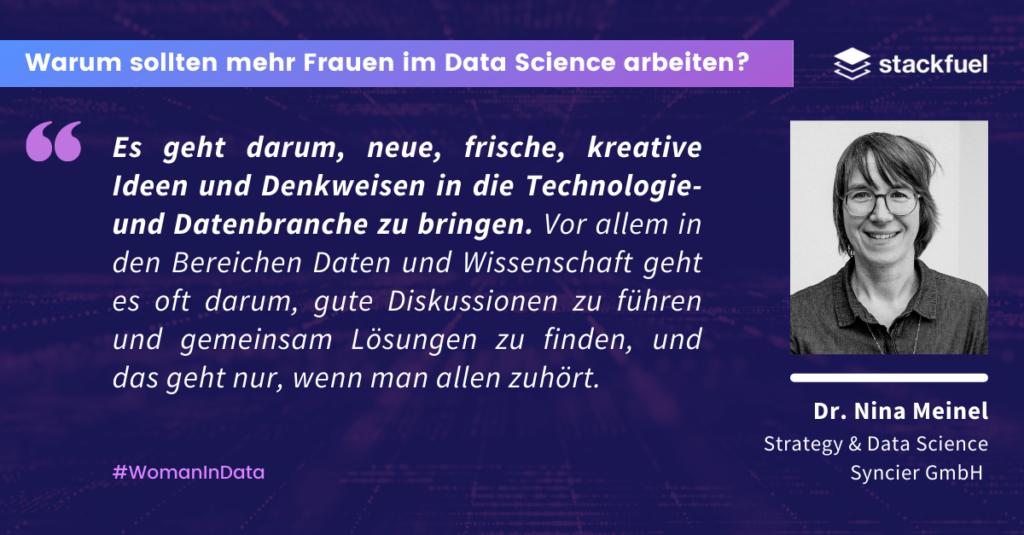
Dr. Nina Meinel, Strategy & Data Science, Syncier GmbH
What do you love about working with data/data science?
It's the data itself, so understanding what the data is about, how and what is measured, and how the data can support a business case. And of course all the fun stuff, the tools, the programming, the visualization and the model evaluation.
How did you get started in the industry?
My love for data came simply from studying statistics at university. The courses were really cool and there were two great departments of statistics and econometrics, one of which even taught back in the 90s.
Why do you think more women should work in tech and data science?
It's about bringing new, creative ideas and ways of thinking to the technology and data industries. Women see things differently, argue differently and can offer a different cool solution. Especially in data and science, it's often about having good discussions and finding solutions together, and that only works if you listen to everyone.
How can we inspire more women to pursue careers in Data Science?
The love of numbers and technology starts very early. Some programs in school would definitely help, as would more female teachers or female data scientists offering courses.
Do you have any advice for women looking to break into the industry?
Never stop being curious, trying new things, asking questions about questions, because you need to understand. And believe in your own abilities, because you can definitely do it.
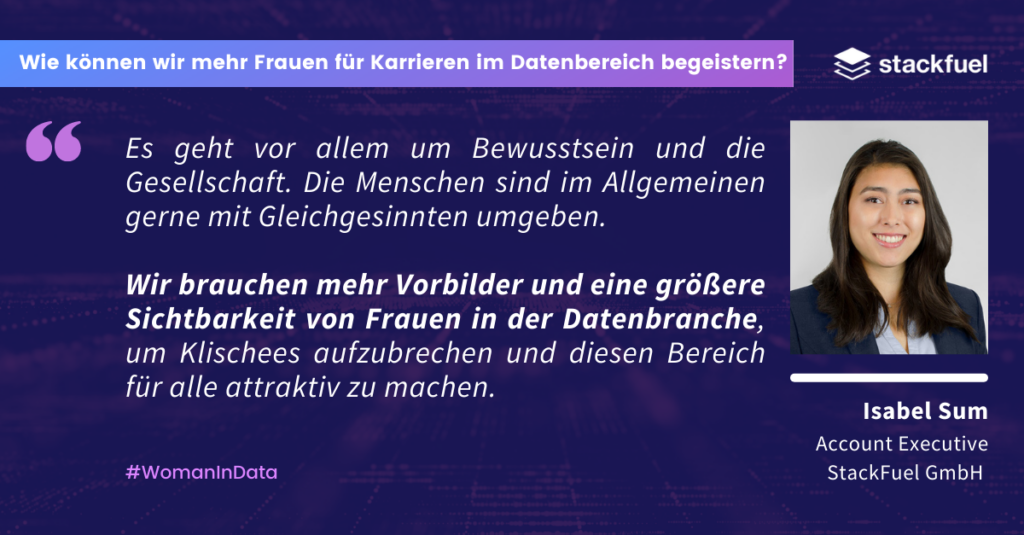
Isabel Sum, Account Executive, StackFuel GmbH
What do you love about working with data/data science?
I love the diversity and possibilities that data science brings, and how it helps us solve previously intractable problems faster, cheaper, and better.
How did you get started in the industry?
I first came into contact with software and IT during my dual studies, when I worked at IBM in various departments and positions. Later, I had the opportunity to learn about and get involved in the fast-paced and ever-changing AI and technology landscape in Shenzhen, China, which further sparked my interest in this field.
Why do you think more women should work in tech and data science?
I believe that more women should work in technology and especially in data science because diversity helps us eliminate biases - both human and machine.
How can we inspire more women to pursue careers in Data Science?
I think it's mostly about awareness and community. People generally like to surround themselves with people who are similar to them. So we need more role models and greater visibility of women in data science to break down the stereotypes and make this field attractive to everyone.
Do you have any advice for women looking to break into the industry?
I would encourage women to attend and network in communities, roundtables, and information sessions around data and AI. Also, there are so many open positions in this field, and it helps to first get a good overview of what industry or field you want to work in, and then just start from there and work your way to where you want to go.
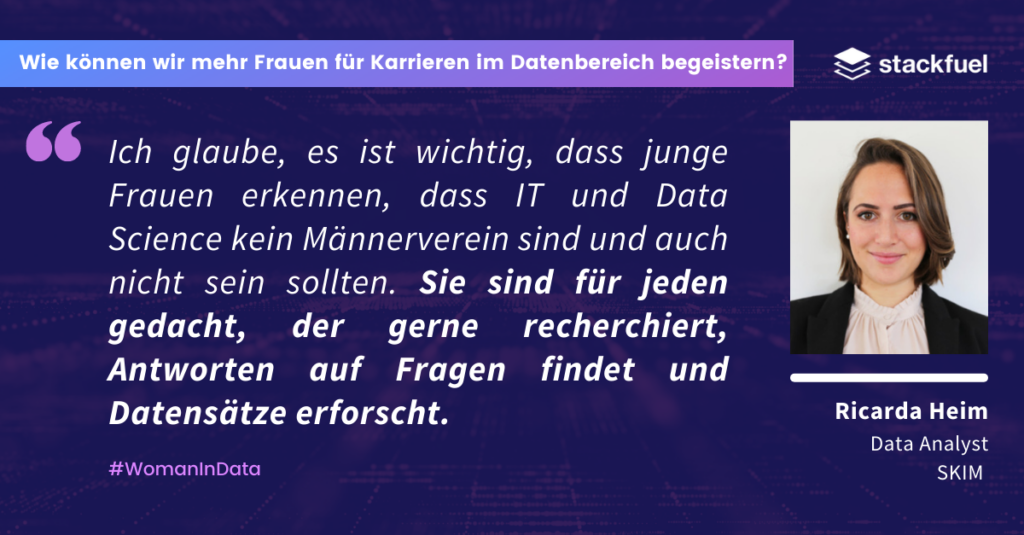
Ricarda Heim, Data Analyst, SKIM
What do you love about working with data/data science?
I love the unambiguity of numbers. There are countless ways to interpret words, but with data it's usually a pretty clear story.
How did you get started in the industry?
After getting my master's degree in economics and econometrics, I knew I wanted to work in an analytical profession. Starting as an analyst is a great way to learn about different methods and approaches and to work with large amounts of data in general.
Why do you think more women should work in tech and data science?
It's a field that's suitable for anyone interested in data and the insights it can provide. And women are just as skilled at it as men. As we collect more and more data every day, we need more and more people to analyze that data to gain actionable insights and use it for good.
How can we inspire more women to pursue careers in Data Science?
I think it's important for young women to realize that engineering and data science are not, and should not be, a boys' club. They are for anyone who enjoys research, finding answers to questions, and exploring data sets. The knowledge and experience you gain is often transferable to other industries, which opens up many opportunities.
Do you have any advice for women looking to break into the industry?
Data is ubiquitous today, so you should know what you want to do with it. What are the areas or products that interest you? What do you want to achieve or do with data? Do you want to work for a company or agency with different clients in different industries? Then work on the hard skills you need.
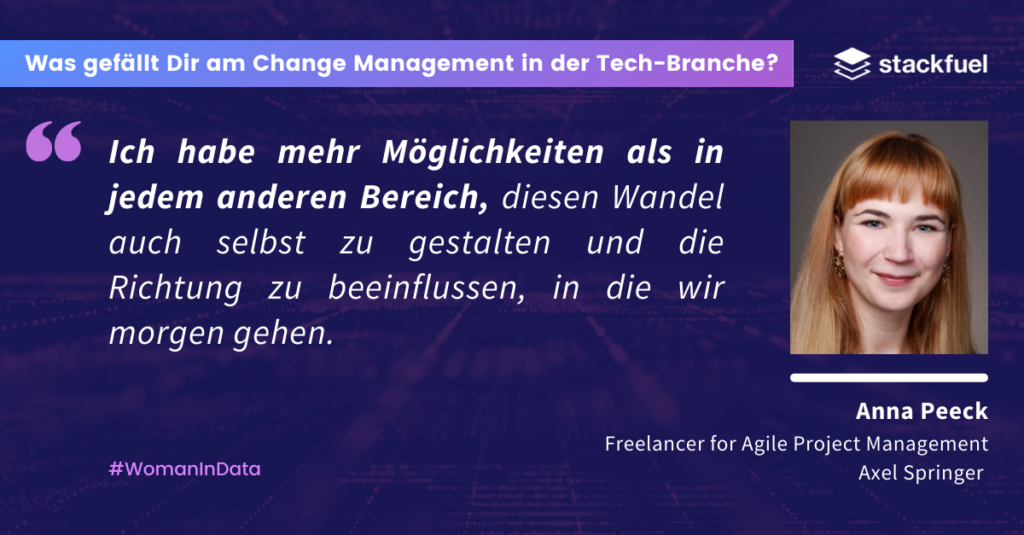
Anna Peeck, Freelancer for Agile Project Management, Axel Springer National Media & Tech GmbH & Co. KG
What do you like about change management in the data and tech industry?
I love that working in tech means I'm part of the fastest changing and most relevant industry in the world today. That means it's always exciting and excitingly fast-paced, but I feel like I have more opportunities than in any other field to also shape that change myself and influence the direction we'll be moving in tomorrow.
The technology industry needs you!
The technology industry now places a lot of emphasis on recruiting, retaining and developing female talent. That's an important signal, but the efforts shouldn't end there. In today's workplace, being qualified with the right skills at the right time is critical to advancing one's career. Data science and data analytics are skills in massive demand. We encourage women to pursue exciting career opportunities in the data science field. Currently, women make up only about one-sixth of the workforce working with new technologies. We strongly believe that the industry needs more women and more diversity to strengthen teams and make them more innovative, diverse and productive.




